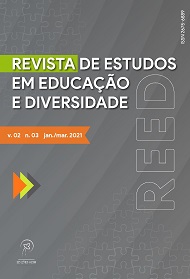(DE)FORMATION JOURNEY IN THE ELIAS CANETTI AUTOBIOGRAPHY NARRATIVE
DOI:
https://doi.org/10.22481/reed.v2i3.8180Keywords:
Elias Canetti ; Autobiography research ; Journey ; MigrationAbstract
This article addresses the Elias Canetti’s autobiography from a formative point of view searching for another meaning for the trip concept, in which desire and pleasure are not present, as one would expect from a sightseeing tour or trekking, but a journey that, involuntary and forcibly, crosses the individual, (de)forming them. Accordingly, the refuge, the escape, the self-exile, they relate a path of personal tragedies that gains other meanings when narrated. Elias Canetti’s autobiographical narrative is divided in three volumes – “The tongue set free”, “The torch in my ear” and “The play of the eyes” – and tells us about the author’s migratory routes across a Europe crumbling under wars and totalitarian regimes which arose in the first half of the 20th century. His testimony is an account of a world that catches a glimpse of totalitarian experiences and the trivialization of evil that marks the history of Western civilization. Elias Canetti’s writings narrates the roads he had to take to avoid direct contact with the Great Wars, and exposes certain (de)formative aspects of migration, as well as how these experiences, so open to uncertainties and rid of any guaranties, appear before the eyes of a young man from a rich family, whose mother tried to protect from the perils of the world. This feature is one of many highlights, a sine qua non element in his stories, because that is where all the terror and pain lie for those who flee their homeland to venture into foreign lands in an almost instinctive attempt to survive. It is in this sense that we work the concept of (de)formation in its relation with the concept of journey.
Downloads
References
ADLER, J. Posfácio. In: CANETTI, E. Festa sob as bombas: os anos ingleses. São Paulo: Estação Liberdade, 2009, p. 193-211.
ARFUCH, L. El Espacio Biografico: dilemas de la subjetividad contemporánea. Buenos Aires: Fondo de Cultura Econõmica, 2010.
BENJAMIN, W. Charles Baudelaire, um lírico no auge do capitalismo. São Paulo: Brasiliense, 1989.
CANETTI, E. Festa sob as bombas: os anos ingleses. São Paulo: Estação Liberdade, 2009.
CANETTI, E. A Língua Absolvida: História de uma juventude. São Paulo: Companhia das Letras, 2010.
CANETTI, E. Arrebatos Verbales: dramas, ensayos, discursos y conversaciones. Barcelona: Debolsillo, 2013.
CANETTI, E; CANETTI, V; CANETTI, G. Dearest Georg: love, literature and power in the dark times. Nova York: Other Press, 2005.
DONAHUE, W.C.; PREECE, J. (Orgs.) The Worlds of Elias Canetti: centenary essays. Newcastle: Cambridge Scholars Publishing, 2007.
FABRE, M. Experiencia y Formación. Revista Educación y Pedagogía, vol. 23, núm. 59, enero-abril, p. 215-225, 2011a. Disponível em: http://aprendeenlinea.udea.edu.co/revistas/index.php/revistaeyp/article/view/8717/8019. Acesso em: 01 set. 2016.
FABRE, M. “Fazer de sua vida uma obra de arte”. Educação em Revista, vol. 27, nº 1, p. 347-368, 2011b.
GADAMER, H.G. Verdade e Método I: traços fundamentais de uma hermenêutica do sujeito. Petrópolis: Vozes; Bragança Paulista: Editora Universitária São Francisco, 2005.
LARROSA, J. Tremores: escritos sobre experiência. Belo Horizonte: Autêntica, 2015.
MÈLICH, J-C. Filosofia de la Finitud. Barcelona: Herder, 2012.
SHASTINA, E.M. E. Canetti and V.V. Rozanov: on type of a Protean Artist. Middle-East Journal os Scientific Research, vol 17, nº 3, p. 300-304, 2013. Disponível em: http://www.idosi.org/mejsr/mejsr17(3)13/7.pdf. Acesso em: 01 set. 2016.
MATOS DE SOUZA, R. As primeiras memórias de um leitor: Elias Canetti em Ruschuk. IN: VICENTINI, P. P.; SOUZA, E. C.; PASSEGGI, M. C. Pesquisa (Auto)Biográfica: questões de ensino e formação. Curitiba: CRV, 2013, p. 189-200.
MATOS DE SOUZA, R.; SOUZA, E. C. O fenômeno da escrita autobiográfica: localizações teórico-históricas. In: SOUZA, E. C. (Auto)Biografias e Documentação Narrativa: redes de pesquisa e formação. Salvador: Edufba, 2015, p. 173-184.
MATOS DE SOUZA, R. Como um escritor é lido? Sobre a apropriação de Elias Canetti pelas universidades brasileiras: Revista Plumilla Educativa (Colombia), nº 14, 2014, p. 225-238. Disponível em: http://revistasum.umanizales.edu.co/ojs/index.php/plumillaeducativa/issue/view/54/showToc. Acesso em: 01 set. 2016.
MATOS DE SOUZA, R. Antes de Auschwitz: ensaio sobre Autobiografia e Formação em Elias Canetti, 209f. Tese de Doutorado. Programa de Pós-Graduação em Educação e Contemporaneidade (PPGEduC/UNEB), Salvador. 2015.
MATOS DE SOUZA, R. As Lições do Lager: experiências com o mal e (de)formação nas narrativas de Lanzmann e Semprun. In: MORAES, D. Z; CORDEIRO, V. M. R; OLIVEIRA, O. V. Narrativas Digitais, História, Literatura e Artes na Pesquisa (Auto)Biográfica. Curitiba: Editora CRV, 2016, p. 129-144.
MATOS DE SOUZA, R.; SOUZA, E. C. A (De)Formação pela escola: representações de processos formativos na Trilogia Autobiográfica de Elias Canetti. Revista Brasileira de Pesquisa (Auto)Biográfica, vol. 1, n. 2, 2016, p. 236-253. Disponível em http://www.revistas.uneb.br/index.php/rbpab/article/view/2659. Acesso em: 23 set. 2018.
MATOS DE SOUZA, R. Viagem (de)formativa na narrativa autobiográfica de Elias Canetti. In: MIGNOT, A. C; MORAES, D. Z.; MARINS, R. Atos de Biogr@far: Narrativas digitais, história, literatura e artes. Curitiba: CRV, 2018, p. 75-85.
Downloads
Published
Issue
Section
License
You are free to:
Share - copy and redistribute the material in any medium or format; Adapt - remix, transform, and build from the material for any purpose, even commercially. This license is acceptable for Free Cultural Works. The licensor cannot revoke these freedoms as long as you follow the terms of the license.
Under the following terms:
Attribution - You must appropriately give credit, provide a link to the license, and indicate if any changes have been made. You may do so in any reasonable way, but not in a way that suggests that you or your use is endorsed by the licensor.
There are no additional restrictions - You cannot apply legal terms or technological measures that legally restrict others to make any use permitted by the license.












